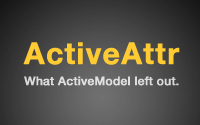ActiveAttr is a set of modules that makes it easy to create plain old Ruby models with functionality found in ORMs, like ActiveRecord, without reinventing the wheel. Think of ActiveAttr as the stuff ActiveModel left out.
ActiveAttr is distributed as a Ruby gem on rubygems.org.
Including the Attributes module into your class gives you a DSL for defining the attributes of your model.
class Person
include ActiveAttr::Attributes
attribute :first_name
attribute :last_name
end
person = Person.new
person.first_name = "Chris"
person.last_name = "Griego"
person.attributes #=> {"first_name"=>"Chris", "last_name"=>"Griego"}Including the AttributeDefaults module into your class builds on Attributes by allowing defaults to be declared with attributes.
class Person
include ActiveAttr::AttributeDefaults
attribute :first_name, :default => "John"
attribute :last_name, :default => "Doe"
end
person = Person.new
person.first_name #=> "John"
person.last_name #=> "Doe"Including the QueryAttributes module into your class builds on Attributes by providing instance methods for querying your attributes.
class Person
include ActiveAttr::QueryAttributes
attribute :first_name
attribute :last_name
end
person = Person.new
person.first_name = "Chris"
person.first_name? #=> true
person.last_name? #=> falseIncluding the TypecastedAttributes module into your class builds on Attributes by providing type conversion for your attributes.
class Person
include ActiveAttr::TypecastedAttributes
attribute :age, :type => Integer
end
person = Person.new
person.age = "29"
person.age #=> 29Including the BasicModel module into your class gives you the bare minimum required for your model to meet the ActiveModel API requirements.
class Person
include ActiveAttr::BasicModel
end
Person.model_name.plural #=> "people"
person = Person.new
person.valid? #=> true
person.errors.full_messages #=> []Including the BlockInitialization module into your class will yield the model instance to a block passed to when creating a new instance.
class Person
include ActiveAttr::BlockInitialization
attr_accessor :first_name, :last_name
end
person = Person.new do |p|
p.first_name = "Chris"
p.last_name = "Griego"
end
person.first_name #=> "Chris"
person.last_name #=> "Griego"Including the Logger module into your class will give you access to a configurable logger in model classes and instances. Your preferred logger can be configured on an instance, subclass, class, parent class, and globally by setting ActiveAttr::Logger.logger. When using Rails, the Rails framework logger will be configured by default.
class Person
include ActiveAttr::Logger
end
Person.logger = Logger.new(STDOUT)
Person.logger? #=> true
Person.logger.info "Logging an informational message"
person = Person.new
person.logger? #=> true
person.logger = Logger.new(STDERR)
person.logger.warn "Logging a warning message"Including the MassAssignment module into your class gives you methods for bulk initializing and updating the attributes of your model. Any unknown attributes are silently ignored.
class Person
include ActiveAttr::MassAssignment
attr_accessor :first_name, :last_name, :age
end
person = Person.new(:first_name => "Christopher", :last_name => "Griego")
person.attributes = { :first_name => "Chris", :age => 21 }
person.first_name #=> "Chris"
person.last_name #=> "Griego"MassAssignment supports mass assignment security/sanitization if a sanitizer is included in the model. If using Rails 4.0, include ActiveModel's forbidden attributes protection module to get support for strong parameters.
class Person
include ActiveAttr::MassAssignment
include ActiveModel::ForbiddenAttributesProtection
attr_accessor :first_name, :last_name
end
person = Person.new(ActionController::Parameters.new({
:first_name => "Chris",
:last_name => "Griego",
}).permit(:first_name))
person.first_name #=> "Chris"
person.last_name #=> nilIf using Rails 3.x or the Protected Attributes gem, include ActiveModel's mass assignment security module to get support for protected attributes, including support for mass assignment roles.
class Person
include ActiveAttr::MassAssignment
include ActiveModel::MassAssignmentSecurity
attr_accessor :first_name, :last_name
attr_protected :last_name
end
person = Person.new(:first_name => "Chris", :last_name => "Griego")
person.first_name #=> "Chris"
person.last_name #=> nilIf using the Strong Parameters gem with Rails 3.2, include the forbidden attributes protection module after including the mass assignment security module.
class Person
include ActiveAttr::MassAssignment
include ActiveModel::MassAssignmentSecurity
include ActiveModel::ForbiddenAttributesProtection
endThe Serialization module is a shortcut for incorporating ActiveModel's serialization functionality into your model with one include.
class Person
include ActiveAttr::Serialization
endThe Model module is a shortcut for incorporating the most common model functionality into your model with one include. All of the above modules are included when you include Model.
class Person
include ActiveAttr::Model
endWhen using ActiveAttr inside a Rails application, ActiveAttr will configure your models' default logger to use the Rails logger automatically. Just include ActiveAttr in your Gemfile.
gem "active_attr"ActiveAttr comes with matchers and RSpec integration to assist you in testing your models. The matchers also work with compatible frameworks like Shoulda.
require "active_attr/rspec"
describe Person do
it do
should have_attribute(:first_name).
of_type(String).
with_default_value_of("John")
end
end
